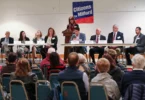By: Michael Warren
Statehouse Correspondant/South Coast Today
State Sen. Marc Pacheco, D-Taunton, said he will be voting no on Question 2, the November ballot item that would lift the cap on charter schools in Massachusetts.
The veteran legislator has several issues with the proposal allowing the creation of up to 12 new charter schools annually across the state. Charter schools play by different rules, he said, opposing teacher certification for example. He also fears it would open the door to a private takeover of education.
Pacheco isn’t alone in his opposition. Four of the five area legislators interviewed about their views on Ballot Question 2 said they would be voting no on the measure, citing concerns that charter schools are detrimental to public schools.
Rep. Robert Koczera, D-New Bedford, said that he is against raising the charter school cap right now because the best practices learned in existing charter schools have not yet been implemented in public schools as had been expected when Massachusetts launched its charter school program in 1993.
“We’re not seeing anything that (charter schools) are doing transferred to improve public education,” Koczera said. “Charter schools were created as a way of experimenting with new techniques.”
Koczera said that he would prefer to see resources invested into improving public schools. Specifically, he called for expanding after-school and summer programs for students as well as lengthening the school day.
“In a relatively short period of time, we’ll be spending $1 billion on charter schools,” Koczera said. “We need the financial resources in public education today.”
Rep. Paul Schmid, D-Westport, also worries that new charters will take money away from public schools.
That said, he acknowledged more “motivated parents” of charter school students.
“Parents are so important to educational progress. I think this puts charter schools in a better position, and we’ve got to figure out how to deal with that,” Schmid said.
Rep. Carole Fiola, D-Fall River, is opposed to raising the charter school cap, but is not opposed to charter schools as a whole. She said that she was a supporter for establishing two charters in her district, because she supports parents’ right to choice, but at this point she’d like to hold off adding more.
Fiola also said that she’d like to see more money invested in public schools.
“There is clear frustration that we need to do more in our public schools,” Fiola said. “I know we have some of the best teachers in Fall River, but we have to give them the tools to succeed.”
Fiola is also concerned that a statewide ballot question was not the best way to address the charter issue. She said she worries about people in other parts of the state influencing what happens in her district.
Rep. Antonio Cabral, D-New Bedford, views the cap increase as just “more of the same”, that does little to help the state’s education needs.
“It really doesn’t do anything to change or enhance or address the finances of how we support both charter schools and traditional public schools,” Cabral said. “The status quo is not the solution.”
But Sen. Michael Rodrigues, D-Westport, sees the issue from the other side, saying that charter schools represent a choice for parents who can’t afford private schools but want something different from public schools.
Rodrigues said that the passage of Question 2 would not necessarily add the 12 new charter schools per year permitted in the referendum.
“They’re not just going to build them without proving to the board of education that there’s actually a demand for those schools,” Rodrigues said. “So I don’t believe you’ll see that many schools because I don’t believe there is that much of a demand.”
Rodrigues added that any new charter schools will be limited to lower-income districts.
Rodrigues disagrees that charter schools have negative effects on the performance of public schools.
“Those communities that have had charter schools have seen the performance of their public schools increase,” Rodrigues said. “In Fall River, where both in our charters and our traditional public schools we’ve seen test scores go up. We’ve seen schools come out of Level Four and rise all the way to Level One status.”
Rodrigues acknowledged that the alternative teaching techniques used at charter schools have been slow to transfer to public schools, but he blames public school administrators.
“Because of the structure of our traditional schools, and their board of governance, it’s more difficult for them to adapt,” Rodrigues said. “I think that is an area that we need to see more improvement in.”
Sen. Mark Montigny, D-New Bedford; Rep. Chris Markey, D-Dartmouth; Rep. William Straus, D-Mattapoisett; Rep. Susan Williams Gifford, R-Wareham; and Rep. Keiko Orrall, R-Lakeville, did not respond to requests for comment for this story.








